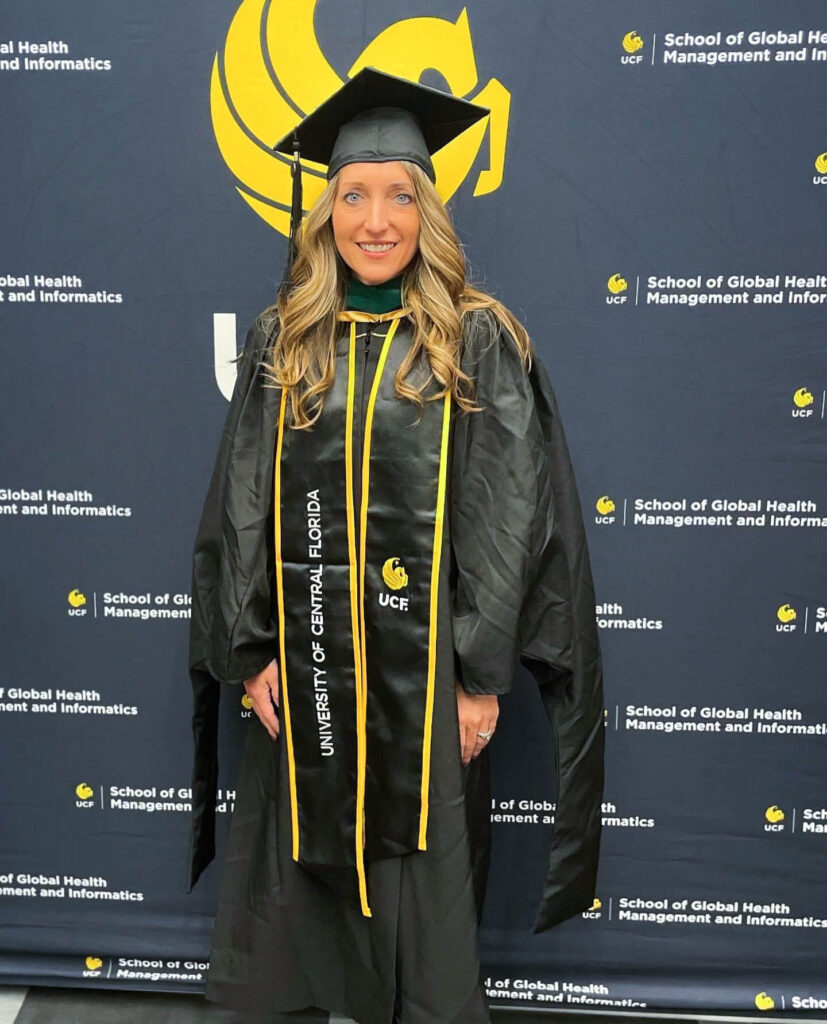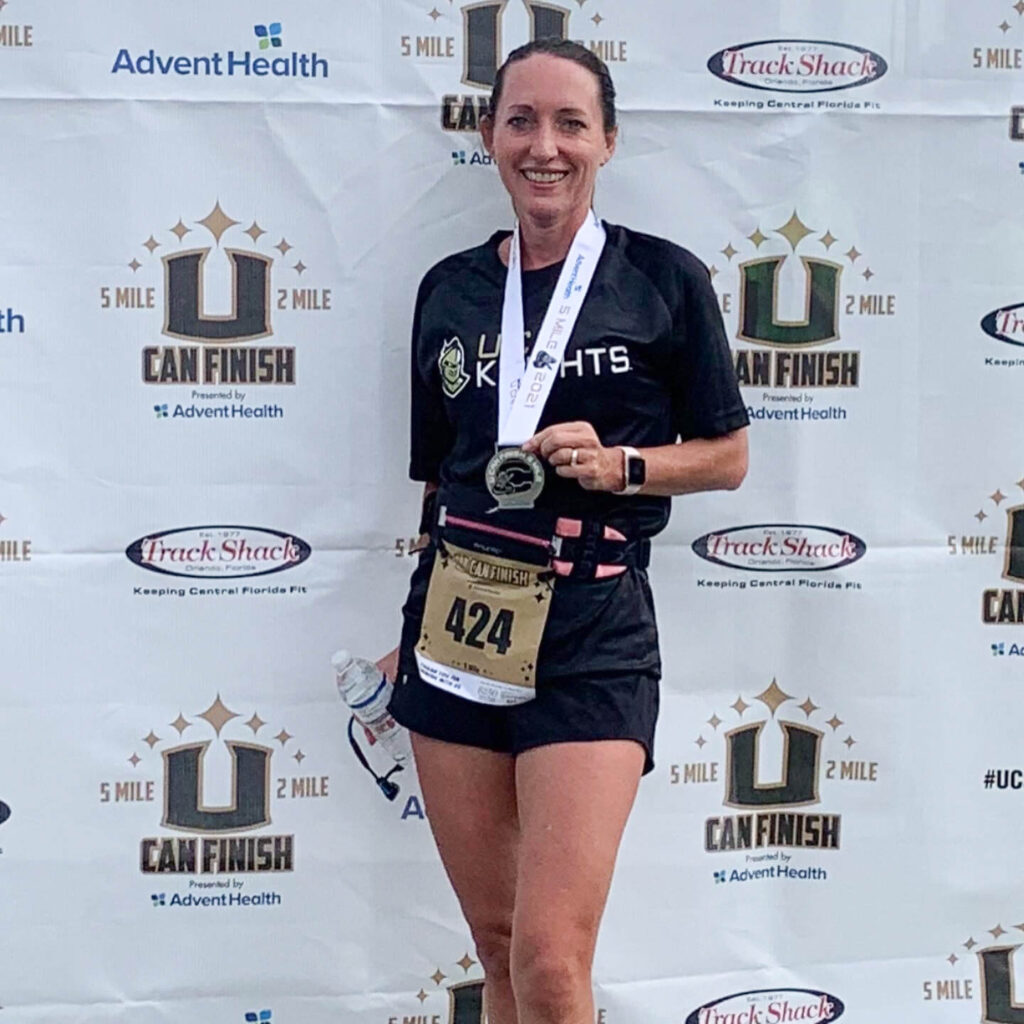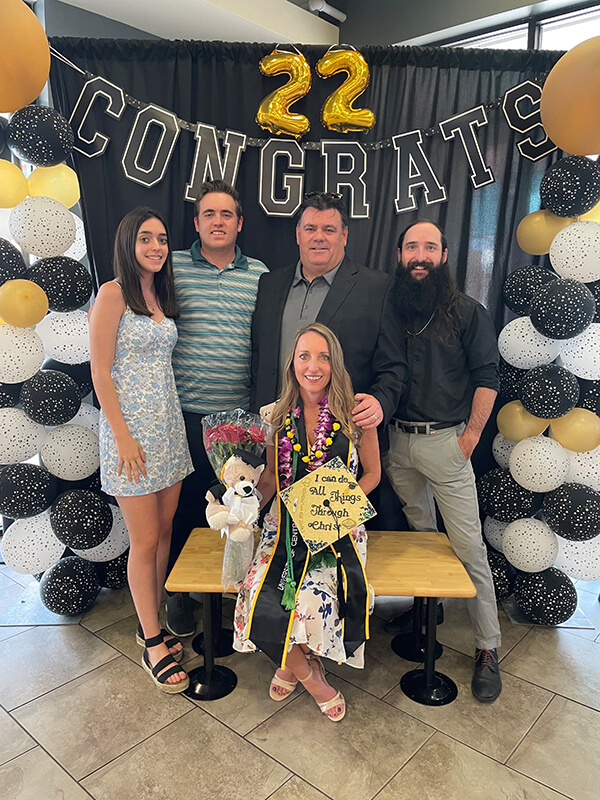Marathon Runner and Hospital Executive Says You Can Finish, Too!
Wendy Sullivan ’22MHA, the executive director of network strategy and operations for AdventHealth Women’s and Children, has a deep, personal connection to AdventHealth that began more than 34 years ago with the birth of her first child. At the time, she was 18 years old.
“I just wasn’t able to go to college,” Sullivan says, “And I knew I had to work.”
She took a typing test and a writing test, and that led to her first job in the emergency room, bed management and obstetrics.
“I had no experience in healthcare, but they must have seen something in me, so they hired me.”
It was a life-changing job for Sullivan – not only for her, but for her family. She didn’t know at the time, but in hindsight, Sullivan believes that God put her in the right place at the right time.
Sullivan continued to work hard, absorbing everything she could about the hospital and its operations. It didn’t take long before someone noticed her tremendous work ethic and recommended her for a job as an office manager in the hospital’s growing marketing department.A few years later, one of the hospital’s senior vice presidents approached Sullivan and bluntly told her that she was not suited for her current role.
The hospital executive tried again. No, he said. But he told Sullivan that she was too bright for her current role, and he wanted to give her an opportunity to go into marketing. To be considered for the promotion, however, she would have to commit to going back to school.
By now, Sullivan was a mom to two, working fulltime, and was also supporting her husband’s rising career at Universal Studios. It would be a daunting task.


“I knew that to advance in the company that I had to go back to school,” Sullivan says. “I also knew that it would take me a very long time.”
She took the first step by enrolling at Seminole State College, getting a big stack of books, and beginning her journey. Still, it took her about 15 years to earn her bachelor’s degree. She was taking one class at a time, most semesters, but sometimes, her workload and personal challenges prevented even that commitment.
“When my daughter was nine months old, doctors told us that she may never walk,” Sullivan says.
This was nearly 18 years ago, and there were very few pediatric neurologists in the area with the clinical competencies to care for her daughter’s special needs. At about the same time, AdventHealth was in the beginning stages of opening a new children’s hospital in Orlando. Sullivan was excited to become involved with the project, which includes the Walt Disney Pavilion. As she was talking with one of the physicians who was also involved with the new hospital, he asked her directly: What makes you want to come to work each day?
Sullivan told him that her family came first, and she was especially interested in making sure that her daughter was able to receive the very best care that the community had to offer.
The physician gently told her to think bigger.
This new hospital, he said, is going to be a resource for all of Florida, and even beyond Florida. Yes, your daughter will be one of the people who will benefit from the outstanding care here, but so will many, many others.
Sullivan said the physician’s wise words helped re-direct her focus of what a premier hospital for children could be.
And after a few years of therapy and interventions, Sullivan’s daughter began to walk. And Sullivan continued thinking bigger. One of the areas of focus turned to pediatric epilepsy. Even though Sullivan continued at full speed as she recruited physicians to the area, she remembers wondering if there were enough children with epilepsy in the Central Florida area who would benefit from the service line. This, of course, was before Sullivan had a chance to do a deep-dive analysis into the market.
The process for determining the need for the epilepsy line – or any specialty service line of healthcare – involves market research of the diagnosis codes that physician practices utilize when caring for their patients, and then determining if it makes financial sense to bring that service line to the community.
“When we were thinking about opening a pediatric specialty clinic in Brevard County about eight years ago,” Sullivan says, “We looked at the data for pediatric cardiology, for example, to find out where those individuals were receiving their care. What we found is that they were traveling out of their community to Palm Bay or Miami to get the care they needed. We knew that it would be better for the patients if they could receive their care closer to their home.”
The process may sound somewhat removed from the goal of caring for the individuals who will benefit from having a special program closer to their home, but it is also crucial to ensure that the hiring and staffing needs of the program are met so that the individuals who need the services can be seen in a timely manner.
After the epilepsy program had been open for two years, Sullivan and her family experienced a medical crisis. Their daughter suddenly began experiencing seizures at age 9. She was diagnosed with epilepsy. The ability to have the epilepsy center so close to home fills her with gratitude each day. Her daughter is managing her medical condition and is also looking forward to starting college.
Looking back, Sullivan may not fully understand the timing of these circumstances, but she certainly understood that she was in the right place at the right time for much of her career. She still had some unfinished business, however.
Having accomplished – finally – the goal of earning her bachelor’s degree in 2020, Sullivan felt complete. Almost.
I never thought in a million years that I would be capable of getting a master’s degree, because I’ve heard the commitment that it takes,” Sullivan says. “But it was always a goal in my mind – a little voice in the back of my head.”
Her initial goal was to have her master’s degree in healthcare administration by the time she turned 50. She missed that target by a little bit, she said. She was just a little busy building hospitals and clinical programs.
At first, Sullivan thought there was nothing a “piece of paper” aka a master’s degree could teach her that she didn’t already know.

“The reason I went back for my master’s in healthcare administration is because it’s given me the knowledge of the ‘why’ that we do things in healthcare,” Sullivan says. “I was able to use real-time information as I was in the program to build performance and build things through the finance component of the course, and I am still able to use even today because now I have a better understanding of how it works in the ‘real world.’”
Sullivan says the group activities offered by the online program allowed her to make connections with others in the industry, and that camaraderie sustained her during the challenging coursework – and they still have a group chat.
“It felt like we were all in this together,” Sullivan says. “The finance class and the statistics class were particularly challenging, but as part of a group, we were all in the same boat together and got to lean on each other. Even when I may not have understood something, there was always someone else in the group who I could ask for guidance.”
Sometimes, Sullivan still can’t believe that she has accomplished so many goals that her 18-year-old self never even dreamed of.
“I would like my fellow Knights – and anyone who is thinking about going back to school – to know that you can do anything you set your mind to,” Sullivan says. “I never thought that I would have a master’s degree, especially from UCF, or that I would ever be able to run nine marathons and 50 half-marathons by the time I turned 50. In fact, getting my master’s degree WAS a marathon, not a sprint, and I am so proud that my children were able to see me walk across the stage, and can now say, ‘Wow, look at what my mom did.”
Article reposted from UCF Alumni Blog Wendy Sullivan ’22MHA Finishes Strong with UCF’s Fully Online Master’s Program
